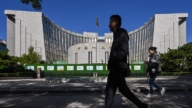【新唐人2013年11月22日讯】中国今年6月的“钱荒”,让当前大陆银行体系存在的流动性风险,受到前所未有的关注。中共中央财经领导小组办公室高级官员日前在财经论坛上警告,由于大陆中小金融机构严重依赖“理财产品”和“同业存款”作为资金来源,明年将会有部分中小型银行因面临资金流动性风险而出现计提、倒闭情况,如果处置不当,将有可能波及整个金融系统。
据大陆媒体《财经》杂志报导,在今年11月20号举办的《财经》年会上,金融行业的安全性成为会场关注的焦点。“中央财经领导小组办公室”巡视员方星海在会上表示,目前大陆金融业主要存在四大风险,包括“流动性风险”、“利率风险”、“资产质量风险”,及包含信托理财、影子银行在内的“或有风险”。这四大风险主要集中在银行领域,尤其是“流动性风险”,将有可能导致中小银行破产。
方星海指出,据银监会透露,目前中国相当一批中小金融机构,特别是中小银行,80%的资金来源,是来自于理财产品、或银行间市场借贷和同业存款,仅有20%是来自于企业的储蓄存款,因而增加了“流动性风险”。
中国金融分析师任中道:“因为老百姓都知道现在存款放在银行里面,那就是一个负利率时代,它不断在缩水,为了获得更多利息,他就去买这种理财产品。为什么说银行的理财产品涉及影子银行呢?因为它不受监管嘛,利用理财产品名义去大量的吸收存款,然后把资金吸收回来再去放贷来赚取利润,一旦链条上某一环节出现了问题,那整个链条就会崩裂。”
由于这些中小银行和金融机构放贷对像主要是房地产以及地方融资平台,都是比较长期的项目,但银行用来放贷的资金来源却是短期的。方星海认为,长此以往,就会导致这些中小金融机构资金周转不灵,出现没有钱还存款的情况,如果处置不得当,一些中小银行极有可能因为“流动性风险”而面临计提、倒闭的状况。方星海警告央行和银监会,应该及时做好处置预案,避免风险扩散到整个金融系统。
在利率风险方面,方星海指出,现在储蓄存款在银行资金来源比例方面在下降,理财产品却备受银行推崇。中小型银行为了争夺资源,在发行理财产品上,一直非常大胆,比四大银行还敢于提升理财产品的利率,使最近理财产品利率上升极快,但这些中小银行的基础资产,可能无法维持这种高报酬率,恐怕会出现因为资产配置产生的收益率,覆盖不了资金来源的成本,导致金融机构的亏损甚至破产。
任中道:“银行由于资金流动性紧张,它只好利用理财产品的高利率来吸收存款,中共的体制导致中国的金融风险是非常高的。老百姓买理财产品最后会亏的很惨。一旦发生危机的话,肯定是会很惨的。最后上告无门,最后只能变成银行的烂账、坏帐,不了了之掉了。”
除了中共财经高官预警,中共国务院有关部门正在加紧制定的《存款保险条例》,一旦实施就代表着允许银行破产的开始。而作为经济晴雨表的股市率先反应,21号,大陆中小型银行股在全线下挫,平安银行跌超过3%,兴业银行、民生银行、浦发银行跌2%以上。
种种迹象显示,中共当局已经知道金融危机无法避免,因此提前放出各种消息,以免危机突发时,民众因承受不住打击而引起巨大的社会动荡。
采访编辑/张天宇 后制/陈建铭
Chinese Communist Party High-Level Officials Warn
That Small Banks Will Go Bankrupt In 2014
China’s “money shortage" of June this year has attracted
unprecedented attention to its banking system liquidity risk.
Recently a senior official of the Chinese Communist Party
(CCP) Central Financial and Economic Leading Committee
Office said a warning at a finance forum;
He said that since small and medium financial institutions in
China rely heavily on “financial products" and “interbank
deposits" as the source of funds, some small and medium
banks will go bankrupt next year facing liquidity risk.
If this is not handled properly, it is likely to affect the
entire financial system .
China’s Finance magazine reported,on the annual meeting of
Finance held on November 20,the safety of the financial sector
became the focus of the venue.
CCP Central Financial and Economic Leading Committee
Officeinspector Fang Xinghai said at the meeting that China
has four major financial risks:
Liquidity Risk, Interest Rate Risk, Asset Quality Risk,
and Possible Risk of trust banking and shadow banking.
These four risks reside mainly in the banking field.
Liquidity Risk, in particular, will likely lead to
bankruptcy of small and medium banks.
Fang Xinghai pointed out that China Banking Regulatory
Commission (CBRC) revealed 80% of the funding of many
small and medium financial institutions, especially small and
medium banks, are financial products.
These products are inter-bank lending and interbank deposits.
Only 20% comes from corporate savings deposits,
thereby the Liquidity Risk is high.
Chinese financial analysts Ren Zhongdao:"People are all
aware that deposits have negative interest.
Money saved in banks constantly shrinks. In order to get
more interest, they buy financial products.
Why do banks’ financial products involve shadow banks?
Because it is not regulated.
Use financial products to absorb a large number of deposits,
and then make a profit by lending.
Once part of the chain has a problem,
the whole chain will crack."
These small banks and financial institutions mainly lend to
real estate and local financing platforms which are relatively
long-term.But the source of funds used by banks is short-term.
Fang Xinghai thinks that these small and medium financial
institutions will have liquidity problems in the long run.
There will be no money deposit.If the issue is not handled well,
some small and medium banks are likely to go bankrupt
because of liquidity risk.
Fang Xinghai warned the central bank and CBRC plan a
solution in a timely manner to avoid the risk spreading to the
entire financial system .
Regarding interest rate risk, Fang Xinghai pointed out that
the ratio of deposits in banks is declining, while financial
products are welcomed.
Small and medium sized banks are very aggressive in issuing
financial products, even more than the four major banks, in
order to compete for resources.
With interest rates of financial products rising very fast lately,
the underlying assets of smaller banks may not be able to
maintain high returns.
Asset allocation earnings not able to cover the cost of funding
will result in losses or even bankruptcy of financial institutions.
Ren Zhongdao: “Banks had to absorb deposits with
high interest rate financial products.
China’s financial risk is very high under the CCP regime.
People who bought financial products will eventually lose
badly. There is no way for people to appeal.
The products eventually just became banks’ bad debts."
In addition to the warning by the CCP high-level official,
related departments of the CCP State Council are drafting
the Deposit Insurance Act.
The implementation of this marks the beginning of
allowing banks to go bankrupt.
The stock market, as an economic barometer, had the first
reaction.
China’s small and medium sized banks fell on November 21st
stock market, with Ping An Bank falling three percent and
Industrial Bank, China Minsheng Bank, and Shanghai Pudong
Development Bank falling two percent.
All these signs indicate that the CCP know about a financial
crisis that cannot be avoided.
They released the news to avoid great social unrests
when people could not handle the blow.
Interview & Edit/ZhangTianyu Post-Production/ChenJianmin






























